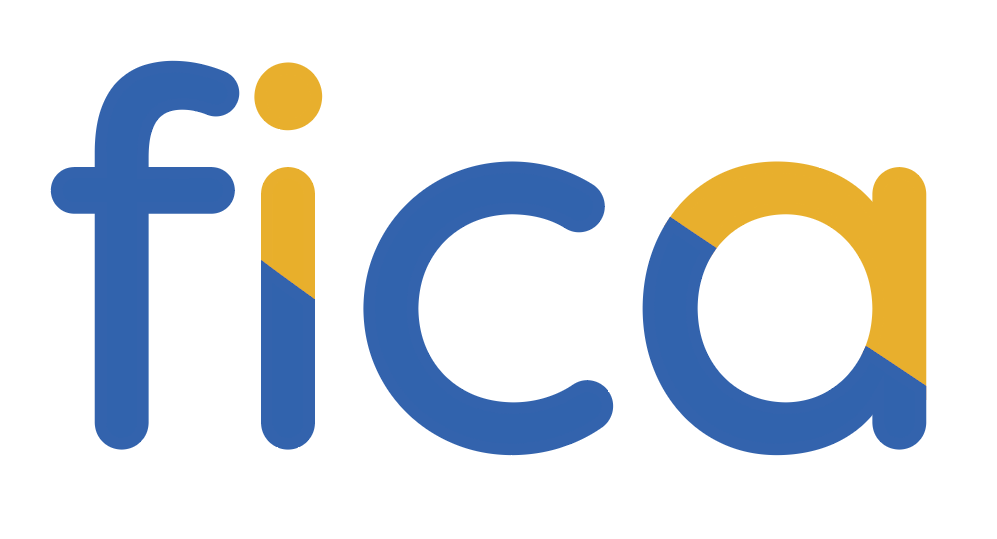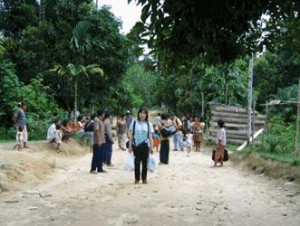One of our objectives in this discovery trip was to study the economic potential of Western Kalimantan. Beside the lieutenant governor and the mayor of Singkawang, we interviewed businessmen, scholars, churches, and community activists. From the government point of view, Western Kalimantan needs to develop farming, mining, and fisheries. These three sectors were developed to provide employment, and increase tax income, which would be used to develop the province.
FICA’s Staff Visit to Sukarame village in West Kalimantan
The government then tried to attract big corporations with massive incentive that sometime went against the interest of the people. For example, the government had to clear up a lot of land to be developed to become palm oil plantation. The government was facing hard time to buy land from the local people especially the Dayak as the land is considered secret to them.
The businessmen and scholars viewed that the government had not acted enough to spur the business activities and hence create employment. On the other hand, the churches and community activists saw the government was taking a wrong direction. They basically had 3 concerns. One, these three sectors were only employing blue collar workers with minimum pay and no prospect to reach middle class. They viewed it is important for Western Kalimantan province to build its middle class to support democracy and improve the social capital. (The social capital was rated very low due to the frequent occurrence of bloody conflicts.)
Second, they knew that big businesses were only interested in profit. Once, the business is not profitable, they just close the business down and lay off all the workers. Western Kalimantan did not have enough service sectors to absorb the older but un-educated workers in the down turn. Third, the activists wanted to create community based businesses that could improve both social capital and organically develop the economy.
These two competing visions, on developing the middle class, were seen in many provinces outside Jakarta. History shows that the presence of big businesses could be beneficial only if they were committed to build the community. The case in point is the city of Kannapolis in North Carolina.
The city of Kannapolis was founded by JW Cannon, the founder of Cannon Mills Company. Cannon Mills Company was the largest textile manufacturer in the world and at one time was employing more than 15,000 people. When the company was booming, the company invested in the community. The community was growing and being developed.
The company was then sold to another textile company that was more concern about profitability. The need for cheap labor and the desire for ever increasing profit made the new owner of Cannon Mills invested less into the community and the town. When the textile business in the US moved overseas, the town basically collapses. A lot of older and uneducated workers could not find jobs. The school systems crumble and the down town becomes a ghost town.
The town then tried to attract big investor to develop the economy. The new billionaire owner of the now defunct company developed research centers which only employ highly educated professionals. The local population is still poor and sidelined to the homeless shelter.
So, what is the biblical model on development? When God created the earth, He said that it was good. God made the earth good not only for our enjoyment but also to sustain our livelihood. The earth could adapt to our culture and to our development (population growth and infrastructure). The reason we have poverty or materially poor is due to our sinful nature. Our sinful nature leads us to destroy the earth for quick gain or to enslave people for massive profit.
God also commands us to subdue the earth. Because we are created in God’s image, we in essence have the capability to create, build, and sustain ourselves with the resources surround us. These resources can be in the form of big businesses that possess the know-how, capital, and technical. The resources are also scatter in the churches or other community group that could personalize the development per individual need. We need to view both the business and NGO as resources. The outsider like us, concerned individuals living outside the area, could be brought in to train the people in specific skills.
It could be confusing sometime to align all these resources together. It takes strong, clean, humble, and courageous leader to pull this through. The leader has to make all these resources to work together for one purpose to alleviate people from material poverty so that they could seek the truth. Our Lord Jesus Christ said that when people are given space to seek the truth, they will find Him and worship Him. As Christians, it is our end goal, for people to worship the true God of the universe and to be in fellowship with Him in heaven.

